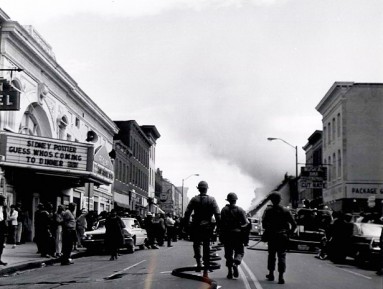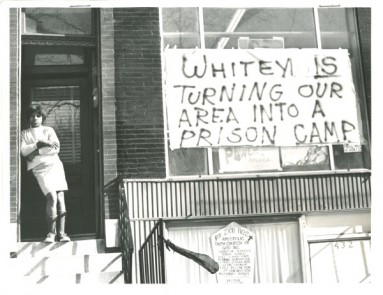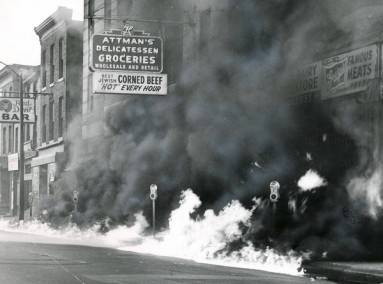If “thug” is the term one face of contemporary anti-blackness prefers to speak, its other mouth has settled on “counterproductive” as the word to say exactly what it means while maintaining plausible deniability. One doesn't have to specify what would be more productive, just a negative definition: anything but this. Anything but CVS. So any time in the past week that commentators and elected officials, from Obama to Loretta Lynch to Baltimore City Council President Bernard Young,wanted to trod a certain rhetorical line with a but you can hear coming a page away, "counterproductive" got mobilized. In some cases, the term came first to mitigate the note of paternalistic pseudo-support to follow. (As in, you totally have a right to your negative affects, provided you express them in the manner we have decided appropriately positive.) Charles M. Blow's NYT op-ed, for instance:
Those enterprises aren’t only criminal, they’re fruitless and counterproductive and rob one’s own neighborhood of needed services and facilities and unfairly punish the people who saw fit to follow a dream and an entrepreneurial spirit, and invest in themselves and those communities in the first place.
[...wait for it...]
But people absolutely have a right to their feelings — including anger and frustration. Only the energies must be channeled into productive efforts aimed at delivering the changes desired. That is the hard work. That is where stamina is required. That is where the long game is played.
For others, like Obama, the term serves as a pivot between two other moves: acknowledging long-term “issues” (Obama: “This has been going on for a long time. This is not new. And we shouldn't pretend that it's new”) and actually just calling people “criminals and thugs” (again, Obama). Between these two, "counterproductive" gets trotted out as expected, meaning almost nothing,
This whole maneuver is hardly new and seems to recur every time anything happens that remotely approaches a rebellion unafraid to lay hands on property or cops, especially when that rebellion is black. And so, in recent months, it became a name for how things kicked off wrong in Ferguson:
However, the rioting, violence and destruction that plagued the collective response to this decision are not simply unproductive, but counterproductive to the causes of justice and equality.
Or in more openly conservative screeds, like the revisionist mutterings of ex-Babylon 5 actors, a way to argue that the Panthers would have been alright if only they just waited calmly for racial equality to unfold naturally:
To be fair, the Panthers were reacting to decades of the evils of state Jim Crow and deliberate federal noninterference. But by the time of their founding, the Civil Rights Act had been passed and events were clearly moving in the direction of racial equality and justice. Such violent pretensions were not only unnecessary but counterproductive.
Or even in actual historians of Caribbean slave revolt: “Slave rebellions were counter productive to the anti-slavery cause.”
But the relevant question isn’t productive as opposed to counterproductive, and never has been. The question is: productive of what?
America only accepted those who would come to be called black Americans because they were productive: because they were slaves who produced the material wealth on which American and Western power was built. Because they were not tolerated but kidnapped, sold, and killed, all to produce a population that was never just addendum, bonus, or small crutch which could have been foregone. Between 1500 to 1820, African slaves made up around 80 percent of all Atlantic passage westwards, the majority of lives on whom the rest rested and the necessary machinery to complete the Atlantic trade triangle. The nascent American state made this unmistakably clear by legally codifying slaves as actual property, as something to be mobilized for economic gain and which had no place outside those sites of production. They were to be hunted down and dragged back on escape: it was the legal obligation of citizens to return productive property to where it could be put to work again. There, they were policed and terrorized not as exception but as routine, as maintenance and training:
Scarcely a day passed while I was on the plantation, in which some of the slaves were not whipped; I do not mean that they were struck a few blows merely, but had a set flogging.
For those distanced from the actual fact of this, nominally well-meaning British reformers used those treated purely as wealth-producing property – as capital, in the most literal and corporal form – as mere rhetorical measures. Richard Oastler, justifiably lamenting the atrocious treatment of child workers in Yorkshire's factories, writes himself into a corner:
Thousands of our fellow creatures and fellow subjects[…] are this very moment existing in a state of slavery, more horrid than are the victims of that hellish system “colonial slavery.” […] Poor infants! ye are indeed sacrificed at the shrine of avarice, without even the solace of the negro slave. [...] Ye live in the boasted land of freedom, and feel and mourn that ye are slaves, and slaves without the only comfort that the negro has. He knows it is his sordid, mercenary master’s interest that he should live, be strong and healthy.
The solace and comfort, indeed.
Others, taking up the case of their own political struggle, wove arguments from the allegedly unbreachable moral border that slavery trespassed. The Huddersfield Political Union, in 1833:
No individual, or any number of individuals, has a right (nor ever had, nor ever will) to exercise a power over another, or any number of individuals, which if exercised over themselves, they would consider, and call unjust… social right either does or ought to emanate from the natural one.
Yet, in those same mills, they quite literally wove the cotton picked by those to whom this schema did not apply: who that very same year came to be nominally recognized as individuals, rather than property, in British law with the Slavery Abolition Act, but who were forced to continue to provide that cotton for another 27 years, with no boycott in sight. It would have been, after all, counterproductive to interfere when industry had such a good thing going.
Over the course of the nineteenth century, that productivity came slowly into crisis for all the Atlantic powers, though not with any accompanying quantitative drop in the numbers of those forced into such use. Far from it: 1860 saw the largest population of slaves in the Western Hemisphere ever, over 6 million, just under 4 million in the US alone. It came into crisis in part because of slave insurrections, the Haitian revolution, fugitive slaves, and international abolition movements, and in part because an ascendent economic order was proving capable of explosive accumulation and diffuse social control beyond what the management of rebellious populations could muster.
The consequence, though, was that as America lost its slaves in name but not in body, it no longer had a juridical matrix by which to codify them as subhuman and to pardon its own atrocities. So America decided on a risky gambit, a long process of massive inversion. It would stop recognizing black people in terms of their productivity, and their productivity alone, and begin to assert the very opposite: that they were not just temporarily but genetically, physiologically, and morally destined to be unproductive. In particular instances over the next century and a half, shades of the old productivity continued: as inmates in prisons, as debtors to predatory lenders, as new demographics to pitch commodities to. Those are exceptions, though. On the whole, America ceased to understand black Americans as "productive," and it has never stopped blaming them for this.
That sort of full-scale historical inversion is no easy task, especially for a white supremacy that wants to assert, despite what it had asserted for centuries prior, how blackness and productivity aren't just casually unrelated. They are entirely unable to coexist. (At least, it suggests, once the chance is lost to realign them by force, through discipline of whip and cudgel.) What to do? Who to call? Obvious as a terrible procedural, America comes to marshall the resources of – what else? – the police, but not just in their literal deployment. The police are mobilized especially in that broader sense of the word that emerged as a particular operation of Enlightenment thought, one which had been refining itself since the seventeenth century. It designated a complex and self-authorizing apparatus centered on a) the control and "reclamation" of terrain seen as untamed and uncivilizable (such as the establishment of British estates in Scotland, along with the Scottish Commissioners of Police, in 1714) and b) in monitoring, measuring, and enforcing the "health" of a society – as when Adam Smith defined the role of the police (as one amongst four categories of jurisprudence) as tasked with "Cleanliness and security," meaning both "the proper method of carrying dirt from the streets" and "the execution of justice, in so far as it regards regulations for preventing crimes or the method of keeping a city guard."
Both senses of police, when backed by the general occupying force of real cops, would be mobilized in full, not just in black neighborhoods but also in a realm of discourse that pseudo-scientifically colonized, measured, and qualified the bodies of black people to find the hidden vault of that unproductivity – and perhaps, its proponents dreamt, of its solution. No project summarizes this more than the absurd work of Frederick Ludwig Hoffman, a statistician who worked for Prudential and who, with their support, wrote the infamous The Race Traits and Tendencies of the American Negro (1896), which, in Beatrix Hoffman's words, “appealed to an American insurance industry that sought to identify poor risks for life insurance."
Thus we reach the conclusion that the colored race is showing every sign of an undermined constitution, a diseased manhood and womanhood; in short, all the indications of a race on the road to extinction.
The excitement, and wishful thinking, can hardly be missed: as they were no longer productive, might black Americans have the good grace to quietly fade into extinction, to become the “vanishing race” that their genetic coding promised them to be?
In case any doubts were possible as to the stakes and angle of this project, in The Condemnation of Blackness: Race, Crime, and the Making of Modern Urban America, Khalil Gibran Muhammad usefully juxtaposes Hoffman's conclusion with his study of white suicide only a year later where he lays the blame squarely on “external” factors:
According to an expert Hoffman cited, these individuals were victims not of “their own vices,” but “of the state of society into which the individual is thrown.” Hoffman agreed, insisting that the “total amount of misery and vice prevailing in a given community” was a manifestation of something fundamentally wrong in society.
He even goes so far as to suggest that these instances of suicide should encourage us to fundamentally alter the social values of capitalism itself:
It is the diseased notion of modern life – almost equal to being a religious conviction – that material advancement and prosperity are the end, the aim, and general purpose of human life… It is the struggle of the masses against the classes.
Faced with the incoherence of his racial model, the actuary veers insurrectionary. In short, for structural violence that affects whites: structural overhaul, if not reformist revolution. For blacks: don’t let the door hit you on the way out of existence…
To the disappointment of white America, that "undermined constitution" was never actually the case, and racial autophagy wasn't on the menu. So the second move on offer must be amplified, unceasingly towards our present: to claim that blackness is not just unproductive, in terms of contributing to civil society, but actually counterproductive. That it actually hinders the health and security of the otherwise stable social body. That it is a plague. That it is criminal: not when taken in aggregate, in a certain situation, but within each instance, within diseased minds themselves.
This is not hyperbole. In the September 1967 issue of the Journal of the American Medical Association, no fringe publication but the central organ of American institutional biomedicine, one can find an editorial authored by doctors William Sweet, Vernon Mark, and Frank Ervin.
The urgent needs of underprivileged urban centers for jobs, education and better housing should not be minimized, but to believe that these factors are solely responsible for the present urban riots is to overlook some of the newer medical evidence about the personal aspects of violent behavior… The lesson on urban rioting is that, besides the need to study the social fabric that creates a riot atmosphere, we need intensive research and critical studies of the individuals committing the violence. The goal of such studies would be to pinpoint, diagnose, and treat these people with low violence thresholds before they contribute to further tragedies.
In short, riots aren't counterproductive because they do not achieve their goals. They are counterproductive because they are an expression of those who are already-counterproductive, those "individuals committing the violence," those ever-ready to riot.
So little has changed of this. White America sees black Americans as something that has to be begrudgingly tolerated. Killed when militant, mocked when on state assistance, envied when successful. It sees them as those who only rarely escape their predestination as criminal, whose attempt to survive dose not contribute beyond itself, at least not within the named boundaries of civil society.
As for the initial question, then: productive of what? At least one answer is clear enough. Blacks were constructed in both white American imaginary and law alike as productive but sub-human. Then as technically human but generally and genetically unproductive (as if unable to even perpetuate themselves beyond some ingrained racial debility). And then as openly counterproductive, a threat to American perpetuity, a scourge going nowhere fast that can, at best, be managed, quelled, and neutralized. In this regard, to ask that a riot be not a riot but productive – that it be work, that it be daily – is to ask that those who riot contribute to what politics has long meant in the US: a reproduction of what already is, an open denial of history.
Obama and his ilk got one thing right, at least and for once. The riots really are counterproductive: they stand both inseparable from this history of production and in direct refusal of it. To demand, against this, that they be productive would be to insist that those involved participate in a schematic with literally no place for them, one which can't manage to offer more than 50% employment in Freddie Gray's neighborhood. Who could want to be productive, given all this?



